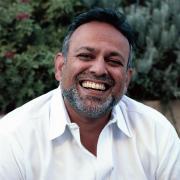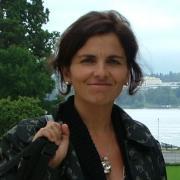SESYNC Welcomes New Advisory Board
The National Socio-Environmental Synthesis Center (SESYNC) recently welcomed a prominent group of academic, nongovernmental, and corporate leaders to its external advisory board. As leaders in social and natural sciences and in their respective disciplines, SESYNC's advisory board provides guidance and support to the Center and its mission.
The External Advisory Board members include:

Director, Environmental Focus Area, Walton Family Foundation
Gold leads the Walton Family Foundation's freshwater and marine initiatives to find lasting solutions that benefit the environment and strengthen local economies.

Global Director, Water Program, World Resources Institute
Over the past several years at the World Resources Institute, Otto has led development of Aqueduct™, a global open source water risk assessment and mapping tool to inform private and public sector investment and water management decisions.

Professor and Associate Dean for Research, Information School, University of Washington
Palmer's current work examines the reuse value of data and problems in access and use across disciplines, as well as emerging best practices in data services.

Associate Professor, Department of Ecology, Evolution and Behavior, University of Minnesota
Seabloom's interests span community ecology of diseases, biological invasions, and restoration ecology, and other basic and applied aspects of community ecology.

Senior Scientist, Cary Institute of Ecosystem Studies
Weathers' research interests include how biology affects geochemistry across heterogeneous landscapes, and within and among multiple systems (air-land-water). She also works at the interface of science and policy, education, and outreach.

Scientist, Microsoft Research
Joppa is an environmental scientist at Microsoft Research, where he leads engagements on environmental sustainability and heads a research program on artificial intelligence, machine learning, and ubiquitous computing technologies for monitoring, modeling, and managing earth's natural environments.

Professor and Associate Dean for Research, School of Natural Resources and Environment, University of Michigan
Lemos' research focuses on: the intersection between development and climate adaptation, the use of technoscientific information in building adaptive capacity to prevent and respond to climatic change impact in the U.S. and Latin America, the impact of technocratic decisionmaking on issues of democracy and equity, and the co-production of science and policy and different means to narrow the gap between useful and usable knowledge.

Director, RTI International's Food, Nutrition, and Obesity Policy Research Program
Muth specializes in analyses to evaluate policy and provide information for policy development in the areas of nutrition, food assistance, food pricing, food labeling, food safety, and other food policy topics. She also specializes in conducting surveys and other types of primary data collection and in developing electronic models and databases to support economic impact analyses of food policy.

Associate Professor and Chair, Department of Natural Sciences, Coppin State University
Jiru’s current research focuses on understanding the socio-environmental and bio-physical issues encompassing water quality in watersheds of Baltimore city drinking water supply system.

Professor of Anthropology, University of California at Davis
Borgerhofff Mulder's research interests lie in evolutionary anthropology, and focus on demography, nutrition, cooperation, social organization, economic development, and the management of natural resources.

Assistant Professor, Maryland Institute for Applied Environmental Health and Department of Epidemiology and Biostatistics, School of Public Health, University of Maryland
With expertise in exposure science, environmental justice, enviromental health disparities, and related studies, Wilson is an environmental health scientist who focuses on various aspects of community engagement and health.

Professor of Ecology, Córdoba National University, Argentina
Díaz is known for her work on plant functional traits, their interactions with global environmental change drivers and their effects on ecosystem processes, and has had a strong influence in the development and practical implementation of the concept of functional diversity and how they affect ecosystem properties and the benefits that people derive from them.

Professor of Biology, Stanford University
Tuljapurkar is Professor of Biology and the Dean & Virginia Morrison Professor of Population Studies at Stanford University, where he directs Stanford’s Center for Population Research and the demography program at Stanford’s Center for the Demography and Economics of Health and Aging.

Principal Investigator, Project Zero, Harvard Graduate School of Education
With a background in cognitive science, human development and education, Box-Mansilla examines how to prepare youth for a world of increasing complexity and interdependence.
About SESYNC
SESYNC's mission is to support synthetic, actionable team science on the structure, functioning and sustainability of socio-environmental systems. The center’s five core objectives are to: enhance the effectiveness of interdisciplinary collaborations among natural and social science research teams focused on environmental problems; build capacity and new communities of socio-environmental researchers; provide education programs to enhance interdisciplinarity and understanding of socio-environmental synthesis; enhance computational capacity to promote socio-environmental synthesis; and enhance relevance of socio-environmental research to decisions and behaviors via actionable scholarship. For more information on SESYNC and its activities, please visit www.sesync.org.